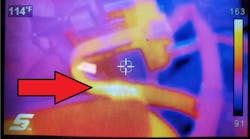Summertime heat is already bearing down on most of the country – and with it, opportunities to earn business servicing your customers’ air conditioning needs! And while the basic physics of cooling the passenger compartment remain the same, how it’s being done has changed considerably. Are you confident you are servicing these new systems professionally?
That’s why Pete Meier, Motor Age technical editor, and G. Jerry Truglia, president of TST, produced “A/C Service Challenges – Today and Tomorrow,” a powerful, informative webinar for technicians of all levels.
New Refrigerant Gaining Ground
It seems like only yesterday that Pete was telling you of the new refrigerants that were on the way. Well, it’s been over six years now since GM first introduced a production model using the new gas, R1234yf, with FCA (Chrysler/Jeep) not far behind!
And many of those models are now out of factory warranty. And that means they’ll be coming to your shop for service when their A/C systems stop blowing cold. In this webinar, Pete and G. discuss the servicing differences and similarities between the R134a systems you’re used to and the R1234yf systems heading your way.
In addition to best service practices, they’ll also show you the tooling you’ll need to properly repair vehicles equipped with the newer refrigerant.
Oh, and by the way, have you tried to buy refrigerant lately? In January 2018, the EPA enacted a new regulation requiring you to be certified under Section 609 of the Clean Air Act in order to purchase any kind of refrigerant for use in a motor vehicle system. In this webinar, Pete and G. explain how the new rule may impact your shop and also discuss why this shouldn’t have become the industry issue it turned out to be.
Watch Out For Hacks!
One major difference, the two presenters point out, is the R1234yf Recovery/Recycle/Recharge machine’s insistence that you perform a refrigerant identification test before it will recover what’s in the car. The reason is in the cost of the refrigerant! R1234yf ranges from $800 to $1000 for a 10-pound tank of the gas, and the last thing you want to do is contaminate it by recovering a bad charge!
But that is not the only reason. Pete and G. have both stressed for years the need to perform a pre-recovery check of the refrigerant in your customers’ cars. Shops like yours have found all kinds of mixtures in their refrigerant tanks, from R22 to propane. Not only is there a huge safety factor (to you and your team) , finding out you’ve recovered a bad charge after the fact does you no good. As Pete points out, “Contaminating your machine’s supply is like catching a virus that you eventually pass on to all the cars you service afterward.”
G. shares another good point in this webinar. “Even that new tank you bought from your regular supplier could be contaminated. Counterfeiters are getting THAT good.” He goes on to share stories of how counterfeiters add sand to the tank to add weight, shorting you on the product you paid for.
“We never put a tank on our machine without identifying it first,” Truglia says.
And we haven’t even talked about the examples Pete and G. share on the use of “Dust Off” in place of R134a! You’ll have to watch the webinar to see that!
More To Come
While R1234yf seems to be the majority choice among the world’s automakers, it’s not the only player in the game. In this webinar, the team shares a brief overview of why the switch to a new refrigerant was made and what it means for techs in the United States in the very near future.
One player discussed is R744, more commonly known as carbon dioxide. Any gas can be a refrigerant if the pressures are right, and CO2 is no exception. The high pressures these systems operate under and the added complexity and cost of the system to make it work, are two reasons it has not been widely adopted. Currently, CO2 is only in use on a few European models offered for sale in the EU. Pete and G. shared that there is no immediate plans for bringing R744 to the States and the SAE is not currently working on any standards to govern such systems.
The same cannot be said, though, for R152a. MAHLE and the Indian car company, TaTa, are working to develop a unique secondary loop system that may incorporate R152a in future models and the SAE is working on governing standards for the design and application of the secondary loop system this refrigerant will need. What is a secondary loop system, you ask? And why does R152a need one?
Cooling And Heating Hybrid And EVs
Keeping the HV battery pack AND the occupants cool and comfortable is another area that Pete and G. tackle in this webcast. When the A/C system is used to keep the battery pack temperature under control, it has to work!
But what about keeping warm in the winter? Did you know that the trend in hybrid and EV designs is to turn the A/C system into a heat pump? Did you know that’s going to impact your troubleshooting of a “low heat” complaint this coming winter?
You would if you watched this webinar!
In addition to all these new topics, Pete and G. stress a variety of “best practices” to help you professionally service and repair every A/C system that comes in your door. Proper charge and recovery, best techniques for leak detection and more are all included in this informative 2-hour presentation.

